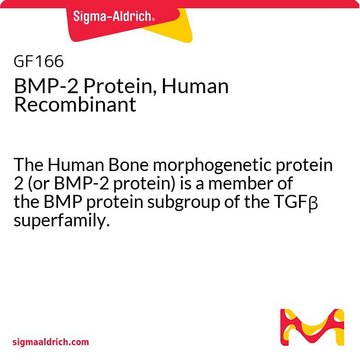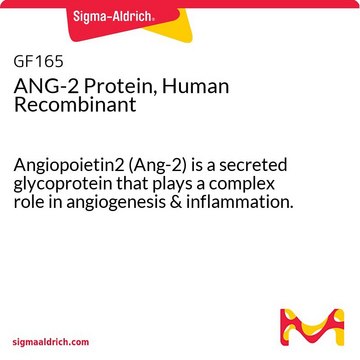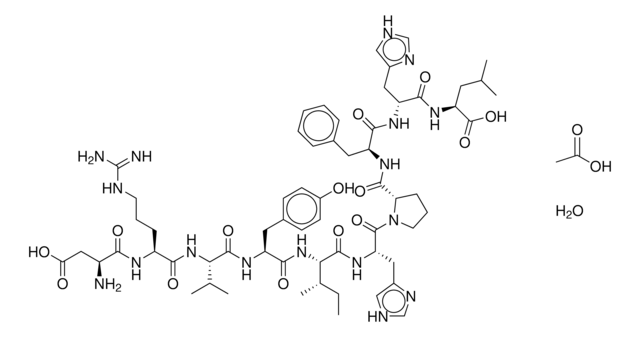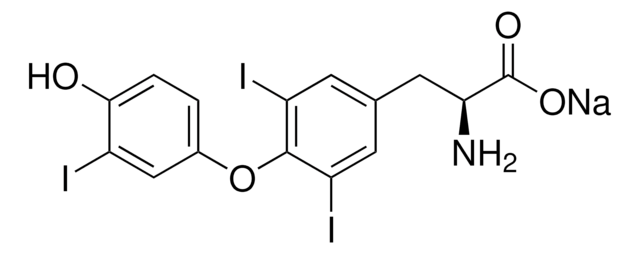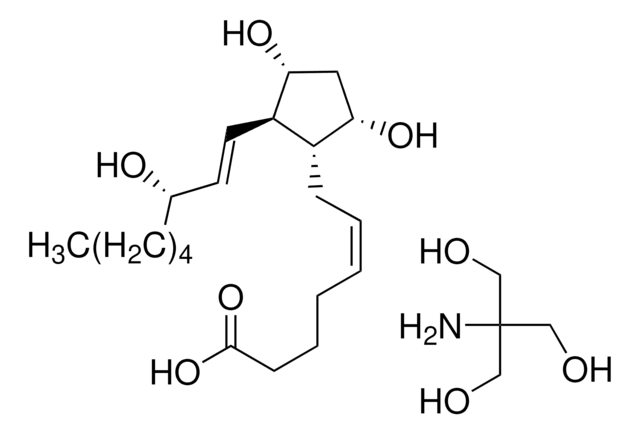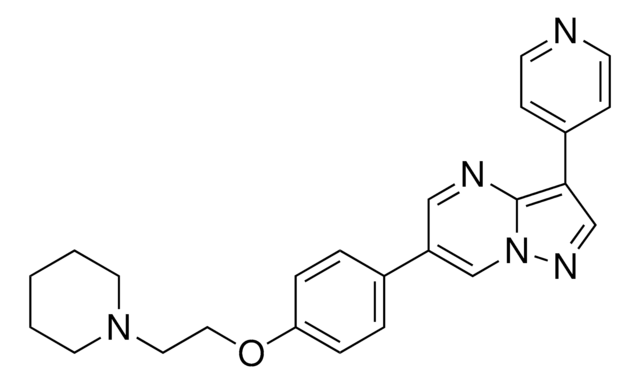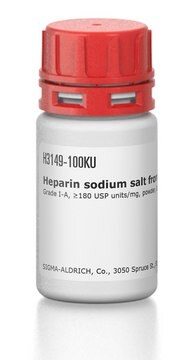GF164
ANG-1 Protein, Human Recombinant
The Ang-1 protein & Ang-2 protein are secreted ligands which bind with similar affinity to Tie2, a receptor tyrosine kinase with immunoglobulin & epidermal growth factor homology domains expressed on endothelial & early hematopoietic cells.
Sinônimo(s):
ANG1, Angiopoietin1, Hepatic fibrinogen/angiopoietin-related protein, PPARG angiopoietin related protein, angiopoietin-like 4, angiopoietin-like 4 protein, angiopoietin-related protein 4
Faça loginpara ver os preços organizacionais e de contrato
About This Item
Código UNSPSC:
12352202
eCl@ss:
32160405
NACRES:
NA.77
Produtos recomendados
Descrição geral
Angiopoietin1 (Ang1) and Angiopoietin2 (Ang2) are two closely related secreted ligands which bind with similar affinity to Tie2,
a receptor tyrosine kinase with immunoglobulin and epidermal growth factor homology domains expressed primarily on endothelial cells and early hematopoietic cells. Tie2 and angiopoietins have been shown to play critical roles in embryogenic angiogenesis and in maintaining the integrity of the adult vasculature. Ang-1/Tie-2 signaling appears to be regulated by Angiopoietin-2 (Ang-2), a natural antagonist for Tie-2 that exerts its effects through an internal autocrine loop mechanism. In addition to suppressing endothelial cell activation by inhibiting the expression of adhesion and inflammatory molecules, Ang-1 enhances endothelial cell survival and capillary morphogenesis, and lessens capillary permeability. As such, Ang-1 has a potential to become an effective therapeutic agent for treating various endothelium disorders, including several severe human pulmonary diseases. Recombinant human ANG-1, derived from HeLa cells, is a C-terminal histidine tagged glycoprotein which migrates with an apparent molecular mass of 60.0 – 70.0 kDa by SDS-PAGE under reducing conditions. Sequencing analysis shows N-terminal sequences starting with Ser-20 and with Asp-70 of the 498 amino acid precursor protein.
a receptor tyrosine kinase with immunoglobulin and epidermal growth factor homology domains expressed primarily on endothelial cells and early hematopoietic cells. Tie2 and angiopoietins have been shown to play critical roles in embryogenic angiogenesis and in maintaining the integrity of the adult vasculature. Ang-1/Tie-2 signaling appears to be regulated by Angiopoietin-2 (Ang-2), a natural antagonist for Tie-2 that exerts its effects through an internal autocrine loop mechanism. In addition to suppressing endothelial cell activation by inhibiting the expression of adhesion and inflammatory molecules, Ang-1 enhances endothelial cell survival and capillary morphogenesis, and lessens capillary permeability. As such, Ang-1 has a potential to become an effective therapeutic agent for treating various endothelium disorders, including several severe human pulmonary diseases. Recombinant human ANG-1, derived from HeLa cells, is a C-terminal histidine tagged glycoprotein which migrates with an apparent molecular mass of 60.0 – 70.0 kDa by SDS-PAGE under reducing conditions. Sequencing analysis shows N-terminal sequences starting with Ser-20 and with Asp-70 of the 498 amino acid precursor protein.
Product Source: Hela Cells
Especificidade
Cross Reactivty
None
None
Aplicação
Research Category
Stem Cell Research
Stem Cell Research
Research Sub Category
Growth Factors & Receptors
Growth Factors & Receptors
Qualidade
Bioactivity assay: Determined by its ability to induce adhesion of human umbilical vein endothelial cells (HUVEC).
forma física
Product is filtered through a 0.2 micron filter before lyophilization.
Armazenamento e estabilidade
Store at -20°C for up to 6 months from date of receipt.
Exoneração de responsabilidade
Unless otherwise stated in our catalog or other company documentation accompanying the product(s), our products are intended for research use only and are not to be used for any other purpose, which includes but is not limited to, unauthorized commercial uses, in vitro diagnostic uses, ex vivo or in vivo therapeutic uses or any type of consumption or application to humans or animals.
Código de classe de armazenamento
11 - Combustible Solids
Classe de risco de água (WGK)
WGK 3
Certificados de análise (COA)
Busque Certificados de análise (COA) digitando o Número do Lote do produto. Os números de lote e remessa podem ser encontrados no rótulo de um produto após a palavra “Lot” ou “Batch”.
Já possui este produto?
Encontre a documentação dos produtos que você adquiriu recentemente na biblioteca de documentos.
Nossa equipe de cientistas tem experiência em todas as áreas de pesquisa, incluindo Life Sciences, ciência de materiais, síntese química, cromatografia, química analítica e muitas outras.
Entre em contato com a assistência técnica